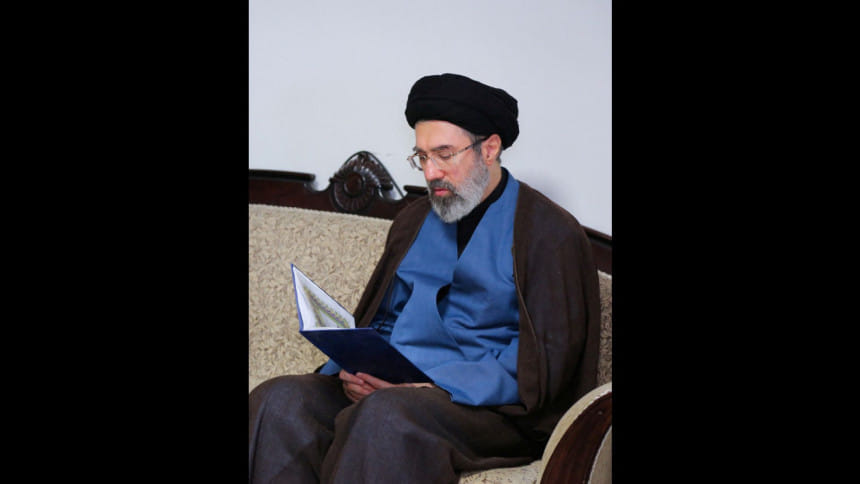Son of Iranian leader Khamenei is hardliner with backroom influence

- Mojtaba Khamenei seen among candidates to replace his father
- Mid-level cleric who has never held formal role in government
- Hardliner who has opposed reformers seeking to engage with West
Mojtaba Khamenei is one of the most influential figures in the Iranian clerical establishment headed by his father, Supreme Leader Ayatollah Ali Khamenei, and among the figures seen as a candidate to succeed him as leader of the Islamic Republic.
A mid-ranking cleric who studied under religious conservatives in the seminaries of Qom, Mojtaba is a hardliner with close ties to the Revolutionary Guards, the force mandated to safeguard the Islamic Republic led by Khamenei since 1989.
Carrying the clerical rank of Hojjatoleslam, Mojtaba, 55, has never held a formal position in the Islamic Republic's government, exercising his influence behind the scenes as the gatekeeper to his father, according to Iran watchers.
His role has long been a point of controversy in Iran, with critics rejecting any hint of dynastic politics in a country that overthrew a U.S.-backed monarch in 1979. Khamenei has himself indicated opposition to the idea of dynastic succession.
The U.S. Treasury Department imposed sanctions on Mojtaba in 2019, saying he represented the Supreme Leader in "an official capacity despite never being elected or appointed to a government position" aside from working his father's office.
Its website said Khamenei had delegated some of his responsibilities to Mojtaba, whom it said had worked closely with the commander of the Islamic Revolutionary Guards Corps' Quds Force and the Basij, a religious militia affiliated with the Guards, "to advance his father's destabilising regional ambitions and oppressive domestic objectives".
Over the past 20 years, Mojtaba has built close ties with the Guards, giving him added leverage across Iran's political and security apparatus, sources told Reuters.
Mojtaba has been a target of protesters' anger in demonstrations since 2009, particularly during months of unrest that swept Iran over the death of a young woman in police custody in 2022, after she was arrested for allegedly breaching the Islamic Republic's strict dress codes.
He has appeared at loyalist rallies, but has rarely spoken in public. Last year, a video was widely shared in which he announced the suspension of Islamic jurisprudence classes he was teaching at Qom, fuelling speculation about the reasons.
He bares a strong resemblance to his father, and wears the black turban of a sayyed, indicating his family traces its lineage to the Prophet Mohammad.
Critics say Mojtaba lacks the clerical credentials to become Supreme Leader - Hojjatoleslam is a notch below the rank of Ayatollah - the position held by his father and Ruhollah Khomeini, who founded the Islamic Republic.
But he has remained in the frame, particularly after another leading candidate for the role - the former President Ebrahim Raisi - died in a helicopter crash in 2024.
AVENUE TO THE LEADER
A U.S. diplomatic cable written in 2007 and published by WikiLeaks cited three Iranian sources describing Mojtaba as an avenue to reach Khamenei.
He has opposed Iran's reformist camp that has favoured engagement with the West and has been embodied by figures such as the former presidents Mohammad Khatami and Hassan Rouhani.
Mojtaba was widely believed to have been behind the sudden rise of hardliner Mahmoud Ahmadinejad in the 2005 presidential election. Mehdi Karroubi, a reformist cleric who ran in the 2005 election, wrote a letter to Khamenei at the time objecting to what he alleged was Mojtaba's role in supporting Ahmadinejad.
Khamenei rejected the accusation.
Mojtaba also backed Ahmadinejad in 2009 when he ran again and won a second term in a disputed election that resulted in anti-government protests that were violently suppressed by the Basij and other security forces.
His wife is the daughter of a prominent hardliner, the former parliament speaker Gholamali Haddadadel.
Mojtaba was born in 1969 in the city of Mashhad, growing up as his father was helping to lead the opposition to the Shah, and as a young man served in the Iran-Iraq war.

 For all latest news, follow The Daily Star's Google News channel.
For all latest news, follow The Daily Star's Google News channel. 



Comments